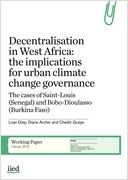Climate change poses threat to human cradle
Climate change in Africa gave rise to modern humans. Now experts fear that global warming linked to carbon emissions will have its worst impact on humanity's cradle. "Africa is the most vulnerable
Climate change in Africa gave rise to modern humans. Now experts fear that global warming linked to carbon emissions will have its worst impact on humanity's cradle. "Africa is the most vulnerable
Energy subsidies, which have a long history of use by governments around the world, have been rising in recent years after a brief period of decline. Despite their significant wider costs, subsidies are
The people on the frontlines of the climate crisis are the world’s poorest and most vulnerable communities. Insurance can play an important role in protecting families from falling into poverty after extreme
CDKN’s flagship book, Mainstreaming Climate Compatible Development, draws from the alliance’s seven year experience of supporting climate compatible development in Asia, Africa, Latin America and the Caribbean.

This paper examines the linkages between decentralisation and urban climate governance through a literature review, supported by two city case studies: Saint-Louis in Senegal and Bobo-Dioulasso in Burkina
<p>A basic meal is far beyond the reach of millions of people in 2020 as the COVID-19 pandemic joins conflict, climate change and economic troubles in pushing up levels of hunger around the world, according to this new study by the United Nations World Food Program (WFP). This report highlights the countries where a simple meal such as rice and beans costs the most, when compared with people’s incomes.</p>
Species distribution models (SDMs) are increasingly used for extrapolation, or predicting suitable regions for species under new geographic or temporal scenarios. However, SDM predictions may be prone to errors if species are not at equilibrium with climatic conditions in the current range and if training samples are not representative.
This paper reflects on the progress made in climate change adaptation in the city of Durban since the launch of the Municipal Climate Protection Programme in 2004. This includes the initial difficulties
Incorporating climate risk management into infrastructure planning and design is critical to building societal resilience and protecting economic growth. As pressures grow to build new infrastructure to
The U.S. Agency for International Development (USAID) has announced that, at least 2.4 million people in the northeast are under threat of short food supply. The agency said the shortage is due to the
Rich countries should immediately mobilize billions of dollars in development aid to the poorest nations to win their trust in the run-up to global climate talks in Copenhagen, a draft EU report says. OECD countries should also fulfill their existing commitments on overseas aid, which would more than double those aid flows to poor nations to around $280 billion annually by 2015, it added.
Some of the developing world's largest rivers including Ganges in South Asia are drying up because of climate change. Researchers from the US-based National Center for Atmospheric Research (NCAR) said this after analysing data combined with computer models to assess river flows across the world.
The effort to ensure long-term financing to address climate change is expected to be a key issue at the year-end UN climate conference to be held at Durban in South Africa. At Cancun, it was agreed that a climate fund would be set up and South Africa would like to make sure that it is operationalised at the Durban conference.
Prime Minister Manmohan Singh on Monday stressed the need for “equity” in global climate change negotiations and said economic growth should not harm the environment. At his meeting in Delhi with the environment
Collaborative research efforts are emerging as a way to effectively address complex challenges such as adapting to climate change. Collaborations that span geographic, disciplinary and sectoral boundaries
The report offers an analysis of the state of emissions reporting across the largest 300 companies in Brazil, Russia, India, China and South Africa. The ET Carbon Rankings apply a uniform methodology across
The African Development Bank (AfDB) and the Climate Investment Funds’ forest investment programme (CIF FIP) have released a report on how unlocking capital can foster forest sector development in Africa
This report provides the most comprehensive and up-to-date scientific assessment of the impacts of climate change, the vulnerability of natural and human environments, and the potential for response through adaptation. It evaluates evidence that recent observed changes in climate have already affected a variety of physical and biological systems and concludes that these effects can be attributed to global warming.

environmental sciences Climate change indicators One of uk
Rifts deepened between rich and poor countries at the UN's Copenhagen climate conference yesterday as world leaders prepared to converge on the Danish capital in a bid to break the deadlock. Several leaders, including Angela Merkel of Germany and Gordon Brown of Britain, voiced doubt over the chances of reaching a deal before talks are due to end on Friday.